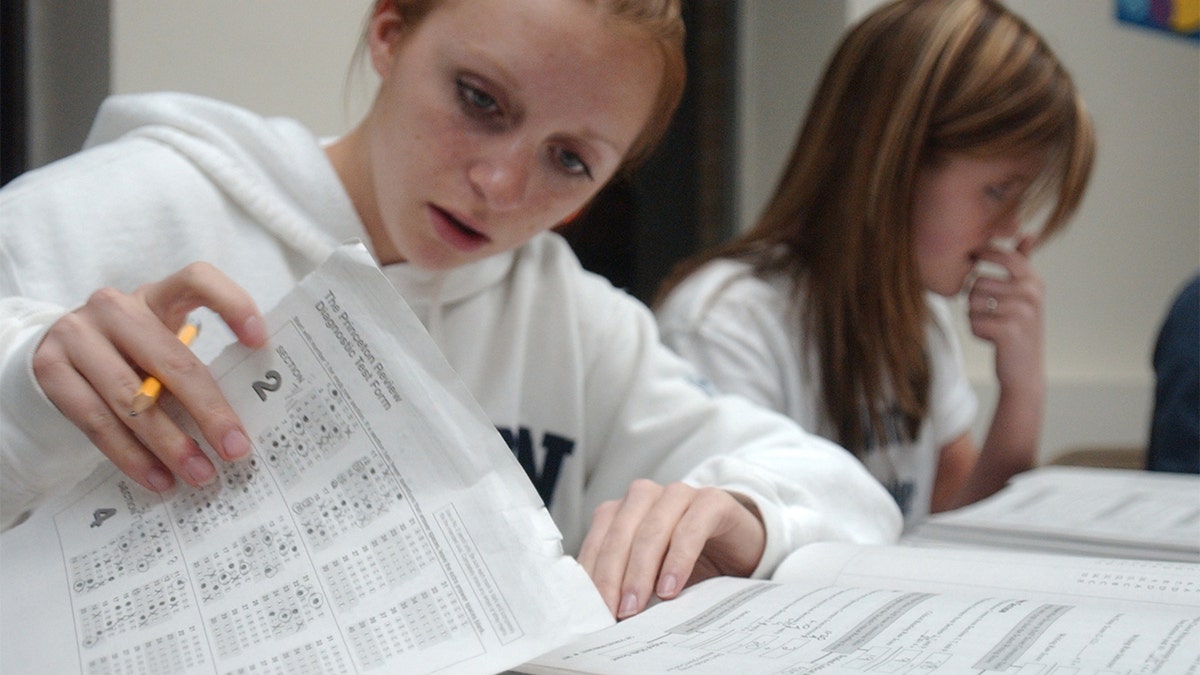Fox News Flash top headlines for January 25
Fox News Flash top headlines are here. Check out what's clicking on Foxnews.com.
The SAT is going digital for American students starting in 2024, when the standardized test designed to predict college readiness will shorten to two hours from three and allow exam-takers to use a calculator on all the math sections.
High-schoolers will be hanging up their No. 2 pencils for good, as the test once administrated on scantrons and with special instructions to fill in the entire answer bubble for each question is re-imagined following a period of remote learning during the coronavirus pandemic.
Amid criticism that the exams favor wealthy, White applicants and disadvantage minority and low-income students, an increasing number of universities have in recent years adopted test-optional policies that let students decide whether to include scores with their applications.
SUPREME COURT TO HEAR CASES AGAINST HARVARD, UNC, FOR ALLEGED ADMISSIONS DISCRIMINATION
In announcing the SAT will go digital Tuesday, College Board clarified that the SAT® Suite of Assessments, which include SAT, PSAT/NMSQT®, PSAT™ 10, PSAT™ 8/9 exams, will continue to be administered in a school or in a test center with a proctor present – not at home.

College-bound Hylton High School student Stephanie Sylla, at home in Woodbridge, Virginia, on Jan. 29, 2021, was unable to take the SAT or the ACT test during the pandemic. (John McDonnell/The Washington Post via Getty Images)
The SAT will be delivered digitally internationally beginning in 2023 and in the U.S. in 2024. The PSAT/NMSQT and PSAT 8/9 will be delivered digitally in 2023 with the PSAT 10 following in 2024.
"The digital SAT will be easier to take, easier to give, and more relevant," Priscilla Rodriguez, vice president of College Readiness Assessments at College Board, said in a statement. "We’re not simply putting the current SAT on a digital platform – we’re taking full advantage of what delivering an assessment digitally makes possible. With input from educators and students, we are adapting to ensure we continue to meet their evolving needs."
TEMPLE UNIVERSITY IN PHILADELPHIA TOUGHENING UP FACE-COVERING RULES, EFFECTIVE MONDAY
College Board said 80% of students who took the pilot digital version of the test in November said they found it to be less stressful. The company claimed it was working to address inequities in access to technology by allowing students to use their own laptop or tablet or a school-issued device.
If students don’t have a device to use, College Board said it will provide one for use on test day. If a student loses connectivity or power, the digital SAT has been designed to ensure they won’t lose their work or time while they reconnect, according to the company.

Rachel Barr, 17, of Scarborough, Maine, takes a pre SAT test on Feb. 23, 2016. (Shawn Patrick Ouellette/Portland Press Herald via Getty Images)
Among the "student- and educator-friendly changes" described by College Board, the digital SAT will be shorter – about two hours instead of three for the current SAT, with more time per question.
The digital test will feature shorter reading passages with one question tied to each, and passages will reflect a wider range of topics that represent the works students read in college, according to College Board. Calculators will be allowed on the entire math section.
WASHINGTON UNIVERSITY IN ST. LOUIS: ‘PROFESSIONALISM’ IS RACIST
Scores will come back in days, instead of weeks. "To reflect the range of paths that students take after high school," digital SAT Suite score reports will also connect students to information and resources about local two-year college, workforce training programs and career options, College Board said.
Rodriguez argued for the importance of standardized testing, asserting test scores can confirm students' grades or demonstrate their strengths beyond what their high school grades may show.

Nicole M. McCoy, 17, left, of Wernersville, and Kerri B. Orzechowski, 17, of Sinking Spring, taking a SAT prep course in Pennsylvania. (MediaNews Group/Reading Eagle via Getty Images/File)
"The SAT allows every student – regardless of where they go to high school – to be seen and to access opportunities that will shape their lives and careers," Rodriguez said. "I am one of those students. I’m a first-generation American, the child of immigrants who came to the U.S. with limited financial resources, and I know how the SAT Suite of Assessments opened doors to colleges, scholarships and educational opportunities that I otherwise never would have known about or had access to. We want to keep those same doors of opportunity open for all students."
In the class of 2020, nearly 1.7 million U.S. students had SAT scores that confirmed or exceeded their high school GPA. That means their SAT scores were a point of strength on their college applications, according to College Board. Among those students, more than 300,000 were from small towns and rural communities; 600,000 were first-generation college goers; and 700,000 were Black or Latino.
In what was considered a pivotal moment for the future of standardized testing, Harvard University announced in December that it would not require the SAT or the competing ACT on applications for at least the next four years. It followed the University of California announcing SAT and ACT scores would not be considered in admissions or scholarship decisions. The 10-school system settled in a lawsuit in which students of color and disabled students claimed requiring test scores put them at a disadvantage.
Amid debate about race and equity in higher education, the Supreme Court agreed Monday to hear cases accusing Harvard and the University of North Carolina of discriminating against White and Asian students in favor of Black or Hispanic students by considering race at every stage of the admissions process.
The digital SAT will still be scored on a 1600 scale. At the start of 2021, College Board had decided to scrap its optional essay portion of the test first introduced in 2005, as well as their subject tests, first made available to students in the 1960s, amid growing popularity of Advanced Placement (AP) courses.
CLICK HERE TO GET THE FOX NEWS APP
About 1.5 million members of the class of 2021 took the SAT at least once, down from 2.2 million in the previous year. A College Board survey found many students want to take the SAT to preserve the option of submitting the scores and qualifying for certain scholarships.
Nearly 80% of bachelor’s degree-granting institutions are not requiring test scores from students applying for fall 2022, according to a December tally by the National Center for Fair & Open Testing, a watchdog group that opposes standardized testing. The group, known as FairTest, said at least 1,400 of them have extended the policy through at least the fall 2023 admissions cycle.
The Associated Press contributed to this report.










































